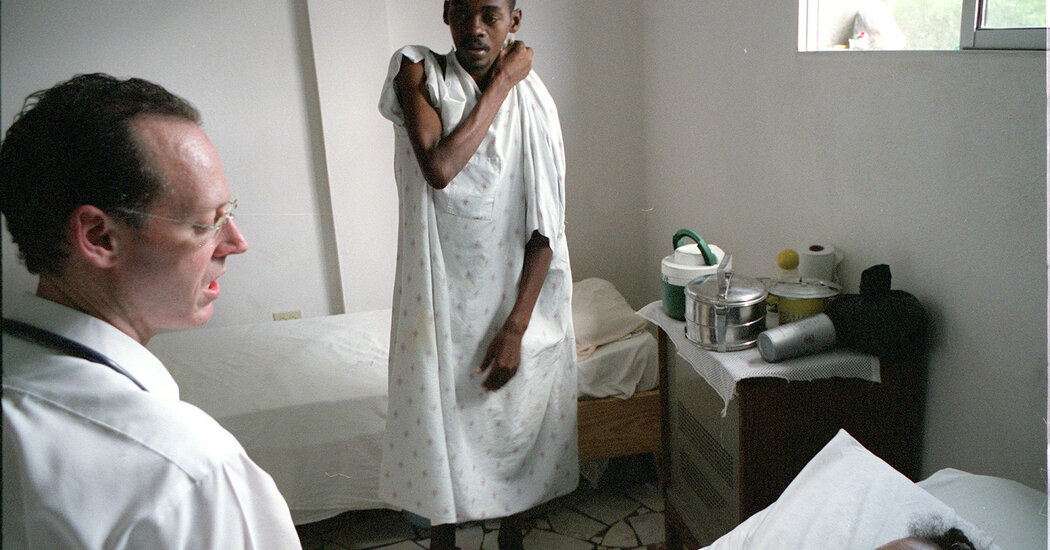More than two decades ago, I had the great good fortune to spend parts of several years traveling with Dr. Paul Farmer, to Haiti, Peru, Cuba, Russia and Mexico for my book about his life. He was a good companion, funny and talkative and when I got sick from a night of too much rum in Cuba, he took care of me.
In airports, he would buy presents for people he was visiting at his next stop. He’d buy present after present until he could barely manage to carry them all. His itineraries weren’t on any of the usual sightseeing lists. In Russia, for instance, he didn’t see the Bolshoi Ballet but rather went to advise beleaguered doctors at a prison where inmates were dying of multidrug-resistant tuberculosis.
Paul’s basic belief was that all human beings deserve equal respect and care, especially when they are sick. His dream, he once told me, was to start a movement that would refuse to accept, and would strive to repair, the grotesque health inequities among and within the countries of the world. When I first met him — in Haiti, in 1994 — he had already created a growing health care system in a desperately impoverished area. I thought he’d done a lot already. Now, looking back, I realize that he was just getting started.
In 1987, he and several friends had founded the organization Partners In Health. Membership has come to include thousands of young people many of whom Paul taught and mentored, and legions of friends and colleagues in the countries where Partners In Health works. Paul was the main inspiration for so many efforts: medical education and hospital-building in countries such as Haiti and Rwanda; campaigns against diseases such as multidrug-resistant tuberculosis, AIDS and Ebola; providing surgery and giving chemotherapy in places where all sorts of illnesses and injuries have typically gone untreated.
From my time with him, I remember most vividly a moment in Lima, Peru, when he had just been reunited with a boy he had treated who had been afflicted with a case of multidrug-resistant tuberculosis so severe that it had broken the long bones of his legs. Paul was visiting a hospital to meet with Peruvian doctors about a different patient when he ran into the boy’s mother and father and saw the boy come running toward him down a hospital hallway, actually running. The boy wasn’t just healed, he was restored. After cries of delight and hugs, Paul met with the Peruvian doctors and then headed out to the parking lot. I sensed that someone was following us. I turned, and so did Paul, and we saw the little boy’s mother approaching with her head bowed. She came up to Paul and said in Spanish, “I want to say many thanks.”
Paul immediately took her hands and said, also in Spanish, “For me, it is a privilege.”
Paul was not a perfect human being, any more than you or I. He didn’t always treat everyone as well as he might have, but to be a patient of his was a great privilege. He was a gifted doctor and a deeply compassionate doctor, the kind of doctor we all would like to have. And I believe that the love of doctoring was the ultimate source of his strength and perseverance in the face of endless obstacles and disappointments. He wanted to make the whole world his patient, and he made a good start on that.
Paul described what he did as “accompaniment,” working alongside others as a member of a large cooperative enterprise. With his Rwandan colleagues, he had conceived and seen to fruition a large medical project in a rural district where there had never been a hospital. This team created a beautiful, full-service facility, which now serves as a cancer-treatment center for the entire country and as the campus of The University of Global Health Equity. Paul had gone there to teach and celebrate the white coat ceremony of its first cohort of medical students. He died on the campus on Monday.
I’m told that he had been up late the night before, seeing patients, which in my experience was for him the equivalent of a night on the town. The next morning, feeling tired, he lay down for a nap and didn’t wake up.
Many people feel deep grief at his death. Speaking only for myself, I find it hard to imagine a world without him in it, especially in this moment when cynicism and cupidity seem to have become cardinal virtues, and compassion and decency are deemed a sucker’s pursuit. But Paul’s plans and dreams live on in the minds of thousands of people, who are equipped and eager to follow his example. I like to think he died happy.
Tracy Kidder is a Pulitzer Prize-winning writer, and the author of “Mountains Beyond Mountains: The Quest of Dr. Paul Farmer, A Man Who Would Cure the World.”
The Times is committed to publishing a diversity of letters to the editor. We’d like to hear what you think about this or any of our articles. Here are some tips. And here’s our email: letters@nytimes.com.
Follow The New York Times Opinion section on Facebook, Twitter (@NYTopinion) and Instagram.


























